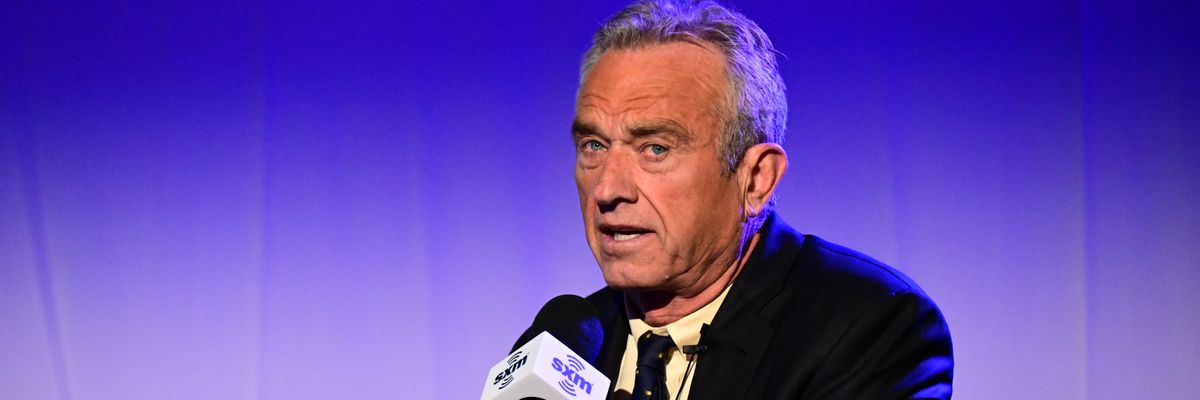If Robert F. Kennedy Jr. follows through on his apparent plans to run for president in the fall 2024 general election, that will make it all the more important for progressives to have a clear understanding of who Kennedy is and what he really stands for.
In advance of announcing that he’ll run as an independent, according to Mediaite, the Kennedy campaign will deploy “attack ads” against the Democratic National Committee for preventing an open primary process. The DNC’s shenanigans deserve to be condemned, and we’ve repeatedly done so, including here, here and here.
Kennedy can be forceful in denouncing aspects of U.S. militarism—making valid points about hawkish foreign policies that shun diplomacy while enriching military contractors. But a closer look at his overall views is needed, lest progressives follow Kennedy into his often inaccurate—and sometimes demagogic—rabbit hole.
Any serious progressive critique of U.S. foreign policy must include a challenge to our country’s one-sided position on Israel/Palestine—which leads to other dangerous policies, such as supporting the Saudi dictatorship (and its horrific Yemen war), while eternally polarizing with and threatening Iran.
"Kennedy’s positions on domestic policies—from the climate crisis to economics to his extreme anti-vaccination views—are often at odds with progressivism."
Kennedy seems to believe that Washington has not been one-sided enough in support of Israel. He pledged in a mid-July interview: “There’s nobody who’s running for president right now in either party who will be a better friend to Israel than me as president.” Kennedy followed up by saying: “Progressive Democrats have become outspoken opponents of Israel. That’s the worst outcome of woke culture.”
And he added: “The criticism of Israel is a false narrative. Israel is a shining star on human rights in the Middle East.”
If you are a progressive who is leaning toward RFK Jr. but cares about Palestinian rights and Middle East peace, you should watch the recent interview with him conducted by Israel-can-do-no-wrong Rabbi Shmuley Boteach. Kennedy questions the “narrative” of Palestinians as “oppressed,” applauds the Israeli military for consistently “avoiding civilian casualties,” says he doesn't want the Biden administration to make a nuclear agreement with Iran, and agrees with Rabbi Shmuley’s characterization of Congresswomen Ilhan Omar and Rashida Tlaib as “anti-Semitic.”
In that July 16 interview, RFK Jr. was evidently trying to do damage control after the discovery of a video from this summer in which he made bizarre comments suggesting that Covid-19 was an “ethnically targeted” bioweapon and that Ashkenazi Jews and Chinese people are the most immune. But Kennedy’s extreme support of Israel and his closeness with Rabbi Shmuley predate those comments. In June, he waved Israeli flags side-by-side with Shmuley in Manhattan’s “Celebrate Israel 75th” parade and declared in a column for Jewish Journal: “I support Israel because I share Israel’s values.”
Kennedy’s positions on domestic policies—from the climate crisis to economics to his extreme anti-vaccination views—are often at odds with progressivism. In a thorough critique, Naomi Klein exposes his faux populism and support from high-tech billionaires. Besides debunking many of his claims about vaccines, Klein points out that Kennedy asserts the climate crisis is being overhyped by “totalitarian elements in our society” and has said that he’d leave energy policy to market forces.
Klein makes clear that RFK Jr. is no economic populist: “On Fox, he would not even come out in favor of a wealth tax; he has brushed off universal public health care as not ‘politically realistic’; and I have heard nothing about raising the minimum wage.”
Kennedy does not have a systemic, class analysis of what’s wrong in U.S. society. Instead, he has a conspiratorial view. And through his use of social media and other outreach, he’s attracted considerable support from the conspiracy-minded right wing. In April, Steve Bannon—seen as the brains behind Donald Trump—commented that “Bobby Kennedy would be an excellent choice for Trump to consider” as a VP running-mate. Both Florida Gov. Ron DeSantis and Trump acolyte Roger Stone said in late July that it might be good to put Kennedy in the next Republican cabinet.
While running for president as a Democrat, RFK Jr. gave friendly interviews to corporate libertarian outlets. That coziness and his consultation with the chair of the Libertarian Party have led to speculation that he’ll end up as the candidate of the Libertarians, whose party was on the ballot in almost every state in 2020. (Going it alone, RFK Jr. would likely not qualify for many state ballots, given the undemocratic hurdles.)
It’s unclear what RFK Jr.’s strategy is. What is clear is that his campaign may end up helping the neo-fascist Republicans win in November 2024. Back in 2016, Trump narrowly defeated Hillary Clinton after both major parties nominated very unpopular candidates. Eight percent of young voters—a demographic that leans heavily Democratic—voted for either the Libertarian or Green parties, a percentage that was much higher in some swing states.
Robert F. Kennedy Jr. offers progressives a mishmash of appealing statements, “free market” corporatism, and assorted political toxins. Not a good deal.

